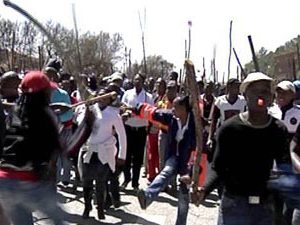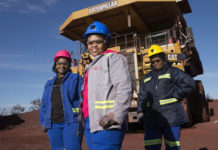
[miningmx.com] – WITH more than six weeks gone since the Farlam Commission’s report was handed to President Jacob Zuma, large sections of South African civil society are increasingly demanding that the report be presented to parliament and made public.
The fact is that we at Lonmin are also eager to know the report’s findings and recommendations so that, if necessary, we can act on them with the briefest possible delay.
That said, we have not sat back and waited for this report to be completed and recommendations to be made. We have undertaken our own due diligence, we have considered and introduced improvements at and around our operations, and have sought to reclaim our relationships with employees.
This approach has already produced signs of greater appreciation by management and labour of each other’s positions.
The strike in early 2014, though very protracted, did not result in the same levels of tension and violence that erupted in 2012.
Since my appointment in July 2013, I have devoted considerable time to meeting Lonmin’s people face-to-face at their workplaces and on their shifts to discuss mutual concerns and listen to their suggestions.
This process has not been an easy one, particularly given the high levels of mistrust between management and employees, between employees themselves, between supervisors and employees and management – the list goes on.
And, an important part of the process has been the need to reclaim our right and role to communicate directly with employees, something we in the mining industry had in some ways abdicated to the unions.
Whatever the Farlam findings, we should all appreciate the fact that many of the socio-economic factors that have affected our industry cannot be resolved overnight or in isolation.
Their resolution will call for close cooperation between the industry, the unions and government, with each contributing to the developments that are necessary.
As far as possible, Lonmin runs its operations on the principle of shared value, accepting that our disparate stakeholders have differing but equally justifiable expectations of the company.
It is common cause that, high among the social challenges that led to the Marikana tragedy, which we refer to as the “week that changed our lives’, was the over-indebtedness of many mine workers.
Many have been caught in the grip of loan sharks, trapped by legal and illegal garnishee orders that can swallow excessive parts of employees’ wages. Lonmin has sought to help employees manage the debt issue by challenging illegal orders, emanating from the loan sharks who charge excessive rates of interest and by negotiating lower interest rates.
At Lonmin this proactive approach has resulted in employees recovering more than R5.2m per month of improper charges against wages.
On a broader front, in partnership with the North West provincial government Lonmin has contributed 52 hectares of serviced land in Marikana and government has started building 400 houses on this land for employees and community members.
Lonmin has converted all of its hostels to provide single occupancy of each room or to provide married accommodation. Our contribution to the costs of educating our employees and their dependents has been increased in the vicinity of the mines and in labour-sending areas and on 30 June 2015 Lonmin will be handing over a school in the Eastern Cape which we have built to the department of basic education.
Underlying all this, however, is the reality that social initiatives cannot be funded to the exclusion of all other calls on the company’s revenues.
Nor can they be funded and maintained unless the company generates profits that can be shared equitably among all stakeholders.
Profits are not to be sneered at; they are necessary if we are to fulfil our obligations to employees and to society as a whole. Value must first be created in order for it to be shared.











